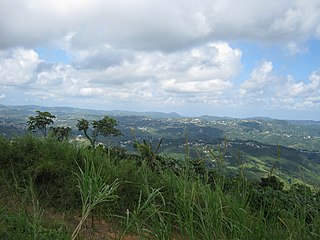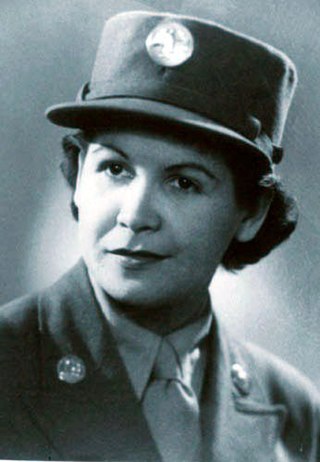
Cidra is a town and municipality of Puerto Rico located in the central region of the island, north of Cayey; south of Comerío and Aguas Buenas; east of Aibonito and Barranquitas; and west of Caguas. Cidra is spread over 12 barrios and Cidra Pueblo. It is part of the San Juan-Caguas-Guaynabo Metropolitan Statistical Area.

Second Lieutenant Carmen Maria Lozano Dumler, RN,, was one of the first Puerto Rican women to become a United States Army officer. During World War II, she served as a nurse and interpreter, and provided support for patients who spoke Spanish. Lozano Dumler has since been featured in promotional and recruitment materials that celebrate diversity in the US military.

Vicente Carattini was a singer and composer of Puerto Rican Christmas-related songs.

Puerto Rico National Cemetery is a United States national cemetery located in the city of Bayamón, in the Commonwealth of Puerto Rico. It encompasses 108.2 acres (43.8 ha) of land, and at the end of 2005, had 44,722 interments. Until 2021, it was the only United States National Cemetery in Puerto Rico. A second United States National Cemetery was built in Morovis, Puerto Rico because the cemetery in Bayamón has reached its capacity.

Tech4 Carmen Contreras Bozak, was the first Puerto Rican woman to serve in the U.S. Women's Army Corps (WAC) where she served as an interpreter and in numerous administrative positions.
This is a brief account of some the Puerto Rican women who have participated in military actions as members of either a political revolutionary movement or of the Armed Forces of the United States.

Puerto Ricans and people of Puerto Rican descent have participated as members of the United States Armed Forces in the American Civil War and in every conflict which the United States has been involved since World War I. In World War II, more than 65,000 Puerto Rican service members served in the war effort, including the guarding of U.S. military installations in the Caribbean and combat operations in the European and Pacific theatres.

Captain María Inés Ortiz was the first American nurse to die in combat during Operation Iraqi Freedom and the first U.S. Army nurse to die in combat since the Vietnam War. The United States Army named the Forward Operating Base Prosperity clinic after her.

The San Juan Nationalist revolt was one of many uprisings against United States Government rule which occurred in Puerto Rico on October 30, 1950 during the Puerto Rican Nationalist Party revolts. Amongst the uprising's main objectives were an attack on La Fortaleza, and the U.S. Federal Court House Building in Old San Juan.

PFC Carmen García Rosado was an educator, author and activist for the rights of women veterans who was among the first 200 Puerto Rican women to be recruited into the WAC's during World War II. Her book "LAS WACS-Participacion de la Mujer Boricua en la Segunda Guerra Mundial", is the first book to document the experiences of the first 200 Puerto Rican women who participated in said conflict as members of the armed forces of the United States.

Rosa A. González, RN, was a nurse, author, feminist and activist. She established various health clinics throughout Puerto Rico and was the founder of The Association of Registered Nurses of Puerto Rico. In 1929, Gonzalez wrote a book titled Los Hechos Desconocidos, in which she denounced the discrimination against women and nurses in Puerto Rico. González’s book convinced James R. Beverley, the Interim Governor of Puerto Rico, to sign Ley 77 in May 1930, which established a Nurses Examining Board. In 1978, she was the first recipient of the Public Health Department of Puerto Rico Garrido Morales Award.

Isabel Freire de Matos was a writer, educator, journalist, and activist for Puerto Rican independence. Freire de Matos was the author of several children's books and the wife of Francisco Matos Paoli, a high-ranking member of the Puerto Rican Nationalist Party.

Isabel Rosado, also known as Doña Isabelita, was an educator, social worker, activist and member of the Puerto Rican Nationalist Party. Influenced by the events of the Ponce massacre, Rosado became a believer of the Puerto Rican independence movement and was imprisoned because of her commitment to the cause.

Leopoldo Figueroa a.k.a. "The deacon of the Puerto Rican Legislature", was a Puerto Rican politician, journalist, medical doctor and lawyer. Figueroa, who began his political career as an advocate of Puerto Rican Independence, was the co-founder of the "Independence Association", one of three political organizations which merged to form the Puerto Rican Nationalist Party. Figueroa, had changed political ideals and in 1948, was a member of the Partido Estadista Puertorriqueño. That year, he was the only member of the Puerto Rico House of Representatives who did not belong to the Partido Popular Democrático (PPD), and the only Representative to oppose the PPD's approval of what became known as the Ley de la Mordaza, which violated the civil rights of those who favored Puerto Rican Independence. On December 22, 2006, the Puerto Rican Legislature approved a law declaring every September 21, Leopoldo Figueroa Carreras Day.

The recorded history of Puerto Rican women can trace its roots back to the era of the Taíno, the indigenous people of the Caribbean, who inhabited the island that they called Borinquen before the arrival of Spaniards. During the Spanish colonization the cultures and customs of the Taíno, Spanish, African and women from non-Hispanic European countries blended into what became the culture and customs of Puerto Rico.

Myrna Vázquez (1935-1975) was a Puerto Rican screen, stage, radio, and television actress. She later became an influential community activist in Boston's South End.















